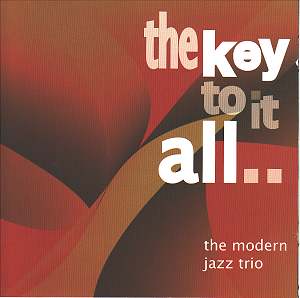1. This Heart of Mine
2. Skating in Central Park
3. I’ll Close My Eyes
4. Where Are You?
5. Melody for a Bass
6. Smoke Gets in Your Eyes
7. Confusion
8. Bye Bye Blackbird
9. Django
10. The Key to it All
11. What Happened Next?
John Horler – Piano
Sam Burgess – Bass
Mike Smith – Drums
Let
us now praise the unsung heroes who supply
us with live jazz at countless venues. Usually
they are tireless workers who don’t do it
for the money but simply for the love of jazz.
One such venue is Watermill Jazz at Dorking
in south-east England, which presents a varied
programme of jazz every week. One session
in February 2006 featured pianist John Horler’s
new group, the Modern Jazz Trio, and this
CD captures most of that performance.
The
band’s title may remind you of the Modern
Jazz Quartet, and Horler is obviously a fan
of that group, since he includes two of its
tunes here – both written by John Lewis. Django
is one of the MJQ’s masterpieces – a tune
which opens with a gentle introduction, leading
into a bouncy theme underpinned by a memorable
double-bass pattern. Here John Horler plays
that pattern on the piano, giving the tune
a new feeling but keeping its seductive appeal.
Bassist Sam Burgess plays a splendid solo
here – and the live recording actually makes
the bass solos audible. John Horler’s solo
covers the gamut from tenderness to funkiness,
with a satisfyingly clean keyboard touch.
John Lewis’s Skating in Central Park
is a lovely waltz, given melodious attention
in the trio’s performance.
Of
the other tracks, five are jazz standards
and the rest are Horler originals. The standards
have often been played – perhaps too often,
so that they could become stale, but in the
trio’s hands they come up fresh and new. Even
Bye Bye Blackbird, a tune I hate because
it is so hackneyed, is given new life by Horler’s
unusual chordings and imaginative soloing,
which includes a burst of double time. Another
highlight is Smoke Gets in Your Eyes,
which Horler starts with the sort of enigmatic
introduction that Erroll Garner loved. Again,
the melody is given new vividness by the pianist’s
unexpected turns. Sam Burgess’s bass solo
is thoughtful and well-structured.
Sam
Burgess is one of the revelations of this
CD. His work throughout the album is excellent
– both in solo and accompaniment. John Horler
wrote Melody for a Bass specially for
Sam and he makes the most of the opportunity
to show his paces as a mature and confident
musician. Mike Smith is no slouch either.
The former drummer with the BBC Big Band supplies
just the right backup on every tune, and he
really shines in the final track, a tour-de-force
which John wrote just for him.
There
was a time when "British jazz" was
almost a term of abuse but those days are
long gone. This group consists of three world-class
players who can challenge all comers. Their
music is extremely skilful, but it is also
(dare I say it?) very beautiful.
Tony Augarde
